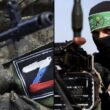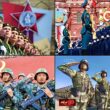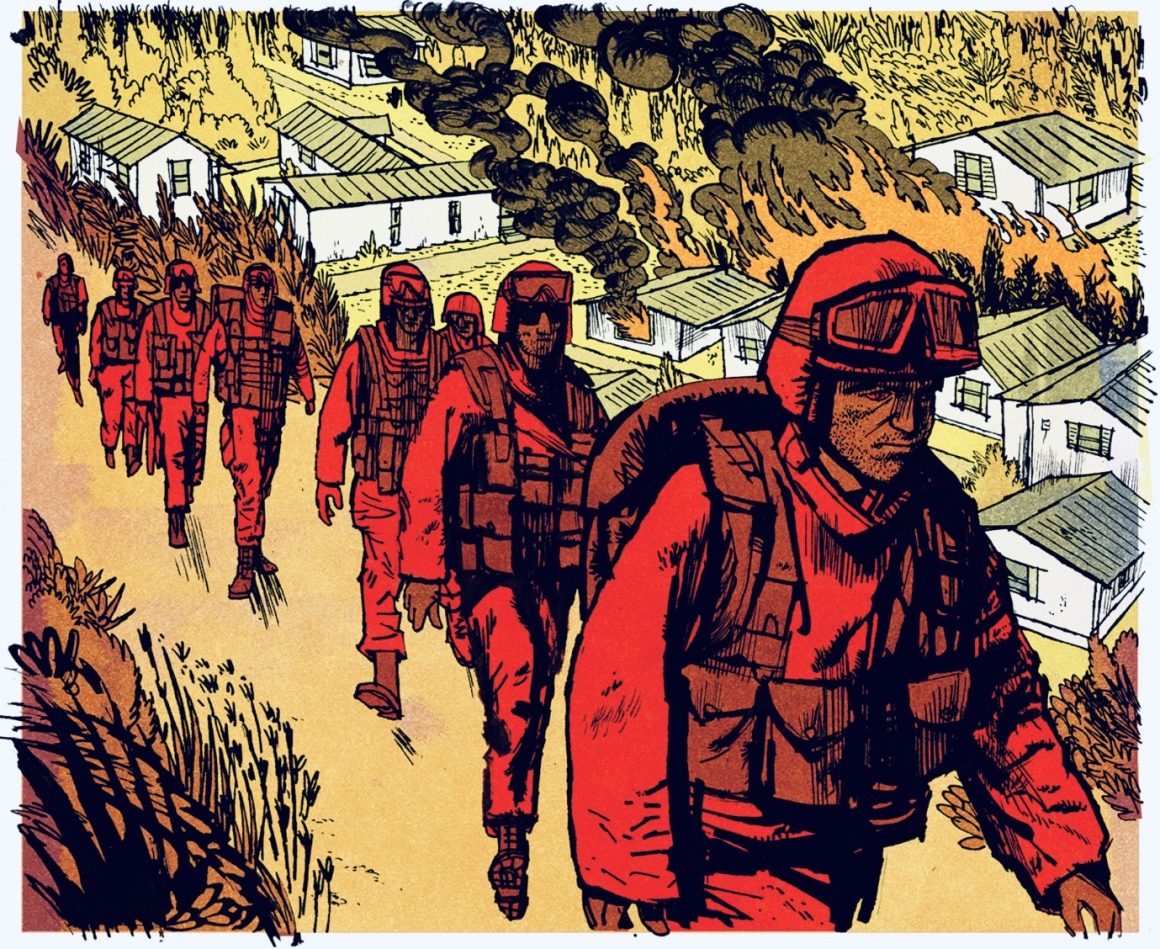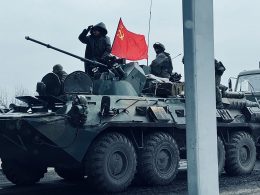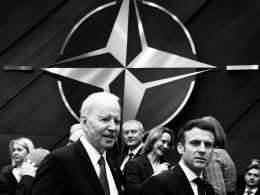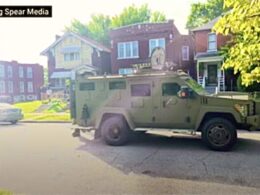Art by Stephen Marche for Foreign Policy
The class conflict within this country is close to crossing a pivotal threshold. This is the threshold where our workers movement becomes too independent from the Democratic Party for it to any longer be sufficiently held back by reformism and opportunism. The question of whether the people can end our society’s appalling class inequality by taking over the Democratic Party has already been answered. By rigging the 2016 and 2020 primaries, the DNC proved twice that it’s capable of shoving out pro-worker candidates, so now the proletariat has no choice but to embrace the revolutionary option. That was always our only choice of course, but these events have demonstrated how reformism isn’t a viable alternative.
The Ukraine proxy war, and the destructive consequences it’s had for working class living standards, have combined with half a century of cruel neoliberal policies to provoke the revolt which will catalyze this upheaval process. Amid rapidly declining wages, and a government that cares more about arms contractor profits than the people, the people are looking for answers. The answer they’re finding is that our socioeconomic system is to blame.
These are the realities of our present conditions that represent the most concerning factors for the U.S. national security state. Factors that threaten the existence of the U.S. empire more than the right-wing insurrectionary movement. Even though since January 6th, public discourse about the prospect of a new American civil war has exclusively focused on the reactionary militias, there’s much evidence that the internal dialogue of the military intelligence community is also oriented around a different kind of threat to the state’s survival. This is the threat of not a fascist revolution, but a proletarian revolution, a revolution carried out by the majority of the population which has a primary material stake in ending the dictatorship of the bourgeoisie. In presenting this evidence, I’ll start with the statements from these national security strategists that pertain to the class conflict’s biggest front at present: the battle against imperialist psyops.
The state anticipated that this moment would come
The reason why it’s in this moment that the Democrats and the broader anti-revolutionary “New Left” are in unprecedented danger of losing dominance over organizing spaces, are about to no longer hold their status as gatekeepers within radical politics, is because the narratives they depend on to maintain this influence have never been so vulnerable. At no previous point has there been a war not only that the ruling class refuses to let end, but that’s having this degree of consequences for the livelihoods of the workers. Because of Ukraine’s exacerbation of the inflation crisis, the Fed’s project to deliberately drive up unemployment so that employers can gain more leverage has been greatly helped. Under these circumstances, the outrage that comes from the people naturally takes on an anti-imperialist character. Opposition towards NATO, the military-industrial complex, and the concept of U.S. hegemony have become instrumental ways that the workers assert their interests.
It’s this emergence of a synthesis between pro-worker sentiment and anti-imperialism within mass consciousness that’s brought the exact scenario the national security state has long been dreading. This is the scenario where imperialism’s cultural hegemony is lost, where a serious opposition towards pro-imperialist ideas emerges. In 2018, the “War Room” forum of the U.S. Army War College posted an analysis by Buddhika Jayamaha, a member of the imperialist intelligentsia who doesn’t have much public prominence but who’s specialized in research on combatant-state relations. Jayamaha lamented the ways the United States is vulnerable to foreign hybrid warfare, which is the pro-imperialist euphemism for “information that exposes the U.S. empire’s crimes”:
Democratic principles and constitutional limitations prevent Western governments’ abilities to respond to covert-hybrid warfare tactics aimed at civil society coming from China and Russia. Such attacks undermine the values, norms, and institutions of the West. Deterring hybrid attacks on Western civil society might only be possible through “strategic patience” and a proper reevaluation of necessary countermeasures that would deter and compel adversaries to change their behavior but without compromising the principles that define western democracies. [Emphasis mine.] The West does not have a robust response mechanism for two reasons. First, we are not properly focusing on the threat and are myopically seeing the threat in terms of criminality, not in terms of transnational warfare. As a consequence, we have not conceptualized the threat appropriately and defined the necessary security space. The direct result of this blind spot, as experienced by a fellow American academic who faced web-based threats initiated by hybrid actors with foreign origins, is that victims have no place to turn to for protection. The local police are incapable, and it is beyond their jurisdiction. The FBI would not know whether to fit it into a counter-espionage investigation or to treat it as cyberbullying. In sum, faced with externally-funded and well-coordinated hybrid warriors who seek to undermine civil society, Western states are failing to protect their citizens.
Now that the decisive moment in the new cold war has come, and Washington has successfully provoked Russia into taking action in Ukraine, the empire has failed to follow that pragmatic strategy of carefully assessing the correct ways to navigate the circumstances. How could it? Empires never respond in a pragmatic fashion when they’re faced with their own decline. They always take reckless actions to try to regain what they’ve lost. The Biden administration’s decision to keep refusing to compromise with Russia, to the point where it escalated into a proxy war in Ukraine, exemplified this kind of recklessness. The White House’s expectation that this proxy war would bring Russia’s destabilization, and by extension the geopolitical defeat of China, was foolish. The BRICs economies are now sure to surpass the economies of the NATO countries, meaning the sanctions on Russia can’t stop Russia’s economy from continuing to grow after last year’s initial blows to it.
Now that the failure of this strategy has become apparent, the imperial state has introduced a bill, the RESTRICT act, that absolutely compromises the democratic principles which the liberal countries claim to uphold. RESTRICT would effectively illegalize international outreach efforts by anti-imperialist organizers, providing the state with the precedent to more easily jail not just those who do that particular type of work but those who simply challenge imperialism in a serious fashion.
The mere suggestion that this could become a law is harming the credibility of the USA, and NATO by extension, as democratic forces. Due to this predictable failure to act according to the pragmatic operating model which strategic warfare experts have recommended Washington adopt during this tumultuous time, the empire has guaranteed the Ukraine psyop will fail. The same will apply to the Taiwan psyop and the other ones the empire next puts forth, so long as the anti-imperialist movement builds a strong enough coalition to be able to effectively repudiate those ones as well. This means the imperialism-compatible element of the left will continue to lose its grip over our liberation movements, freeing communism to become mainstream again and leading to an escalation in the class conflict.
RESTRICT as the new primary counterinsurgency weapon
Whether or not RESTRICT passes, the drive towards criminalizing dissent that it represents will continue to grow stronger. This bill represents the point where the class struggle, after overcoming the softest aspect of the counterinsurgency, faces the obstacle from the next stage: expanded state repression. The controlled opposition can’t delay the rise of revolutionary organizing forever, a strong workers movement with an anti-imperialist character is gaining prominence. The growth in unionization and strikes from recent years has begun the process of rebuilding America’s labor movement. Now with the anti-NATO movement, these labor battles are gaining the anti-imperialist synthesis needed for them to become a serious threat towards the state. What can turn these dual movements into a revolutionary mass mobilization are the communist organizations, and broader organizations that have embraced an anti-imperialist role. If these entities can’t be destroyed through infiltration, co-optation, and organizer gatekeeping, the state’s next resort is to illegalize ever more of their activities.
The problem that comes with making repression into the new main counterinsurgency weapon, as I said, is that this comes at the cost of assuring the state can no longer fulfill the first objective of a counterinsurgency: to keep the popular consciousness on the side of the existing government. RESTRICT would make it apparent that the state doesn’t value the people’s privacy, freedom of assembly, or freedom of expression. Last year’s raid of the African People’s Socialist Party for supposedly perpetrating Russian interference is what the feds will be able to do to anti-imperialist orgs all the time if RESTRICT passes. Which would undermine the goals described in Joint Publication 3-24: Counterinsurgency:
The struggle for legitimacy with the relevant population is typically a central theme of the conflict between the insurgency and the HN [host nation] government. The HN government generally needs some level of legitimacy among the population to retain the confidence of the populace and an acknowledgment of governing power. The insurgency will attack the legitimacy of the HN government while attempting to develop its own legitimacy with the population. COIN should reduce the credibility of the insurgency while strengthening the legitimacy of the HN government. COIN planners should compose a unifying message (the COIN narrative) that is consistent with the overarching USG narrative, which is coupled to the USG [U.S. government] objective. Narrative is a structure of planned themes from which both messages and actions are developed.
Narrative provides a common thread of communicative influence. The objective speaks to desired outcome; narrative communicates the story of the how and why of an operation. Common themes within a COIN narrative may be: reinforcing the credibility and perception of legitimacy of the HN and USG COIN operation, exploiting the negative aspects of the insurgent efforts, and preemptively presenting the expected insurgent argument along with counter-arguments. … The COIN narrative should be the result of meticulous target-audience analysis conducted by cultural and language subject matter experts … The COIN narrative should provide the guidance from which themes, actions, and messages can be planned in support of the COIN objectives.
Under conditions where the government is jailing anti-imperialists for exercising rights that they just used to have, such a narrative management project will be more limited in its potential than it can be now. Think of what our society will be like five years from now if RESTRICT or other such laws have been passed. The population will be living in an economy that’s gone through an unprecedented disaster, a disaster that was multiplied by the government’s waging a proxy war. The narratives which justified this proxy war were exposed, and exposed to the knowledge of millions; when Hersh confirmed that Biden blew up Nord Stream, his reporting reached a big enough part of the population for the anti-NATO movement to start gaining national attention. What will it look like when the people are seeing the organizers behind this movement be jailed on spurious charges, charges even harder to back up than the ones which were used to persecute Manning and Assange?
The social base that the state depends on to maintain stable civic control will be lost under these circumstances, at least as long as revolutionary organizers keep our movement going in the midst of the intensifying retribution. Yet this drastic measure by the state still won’t have undermined its narrative control enough that a revolutionary scenario has become imminent. That’s for a later stage. The system has ways of maintaining the illusion of democracy, the perceived justifiability of American militarism, and the narratives that legitimize our national security state. We saw this with Russiagate, which is ongoing in a form different from its initial one.
Russiagate was able to distract from the moral bankruptcy of the liberal class, the systemic failures that led to Trump’s election, and the criminal schemes within the U.S. empire’s new cold war. It did this by shifting the blame onto “foreign interference,” and by implicating Assange and other anti-imperialists within a worldwide operation to undermine “our democratic institutions.” The effect was that an online censorship campaign against anti-imperialists was provided with justification, while the Democratic Party could posture as the country’s savior in the face of a GOP that had “sold out to Putin.” The two-party cycle of tyranny managed to keep itself alive through this vast, conspiratorial psyop. AOC’s participation in the Ukraine proxy war is a product of this. When the DNC used Russiagate to pivot towards neocon foreign policy, it created an environment where every Democrat politician had to assimilate to this policy no matter how far “left” they are.
Going into 2024, the narrative managers are trying to revive Russiagate. But during this new, more extreme phase of the censorship, where anti-imperialists are targeted not just with online bans but with criminal charges, the democratic illusion is not as easy to maintain. The pro-war, upper income strata types who the Democrats have made into their new primary base will accept the persecution campaign against anti-imperialists, but this base is limited. These consciously pro-imperialist labor aristocrats and petty capitalists are the minority, whereas the workers who are being harmed by this war are the majority. The only reason why the Russiagate psyop was successful at maintaining America’s oligarchy is because that privileged minority, the element which closely follows the imperialist media and is invested in attacking anti-imperialists, was by default the most active within political and discourse spaces.
The left anti-communists and Democratic Party infiltrators who get sent into activist spaces are the left flank of this element. They represent what’s called petty-bourgeois radicalism. Now that working class politics is rising to replace petty-bourgeois politics as the dominant force within organizing, the new phase of suppression against anti-imperialists will inevitably inflame the class struggle. Working class and working class-oriented political actors are not receptive to what the imperialist media says, they’re receptive to what anti-imperialists say. They’re the social base for this struggle, what can bring us to victory as our revolutionary crisis heightens ever more.
When the Baghdad counterinsurgency model has to be imported
The impulse of the ruling oligarchy’s most reactionary wing is to automatically respond to dissent by implementing the model of military rule that U.S. imperialism has utilized in places like Baghdad. Trump wanted to do this during the summer of 2020, when he threatened to invoke the Insurrection Act. But at that stage the optimal tool for preventing a revolutionary scenario was co-optation, so the most severe the repression got was when federal agents used black-bagging arrest tactics on random demonstrators. It was a violation of civil liberties, but it only amounted to a standard protest arrest sweep with extra steps to make the experience more intimidating. What Trump and his element of the ruling class want to do is make the 2020 counterinsurgency’s curfews, National Guard involvement, and police violence campaigns against peaceful demonstrators into permanent new parts of American life. They want to effectively suspend the First Amendment so that all who challenge the state, violently or not, are now classified as enemy combatants to be hunted down.
Should an ultra-reactionary kind of fascist like Trump or DeSantis become president, they’ll be inclined to carry out this project the next time there’s a revolt. The thing holding them back is the broader ruling class apparatus, represented by the intelligence agencies and their Democratic Party allies, which provide a balance in the state structure that won’t let the GOP become an autocratic force. The imperial state is set up to ensure that erratic actors who lack strategic intelligence don’t destroy the empire by doing something foolish, like replicating the Baghdad counterinsurgency when the conditions don’t necessitate this. That’s why the liberals have clung to Russiagate amid its countless factual inconsistencies: they see that Russiagate is the tool which can keep the empire stable. Which can stop the increasingly fragile American republic from getting sabotaged by an unhinged ruler, like how Rome was sabotaged by Nero during the later stages of its decline.
Yet at a certain point, Russiagate and its related psyops will no longer be able to stop America’s internal tensions from growing severe enough that such a military repression campaign becomes necessary. The stronger our revolutionary organizations get, the less effective the RESTRICT policing model will become, and the armed forces will have to be put to their full potential domestic use. Yet even that may fail to save the state. It may fail because the costs to popular support that come with it will be even more severe than the ones that will come with RESTRICT. Living under a “constitutional republic” that’s acting like a military dictatorship will be too much for the people. Most of all for the ones who’ve already been forced to the margins. Poor black communities are already in effect living in this situation, as they’re occupied by police which have always regarded them as enemies and which continue to gain more military surplus equipment. An actual domestic military occupation would bring these kinds of conditions to the country as a whole, while making the existing oppression even more acute for the U.S. empire’s internal colonies.
Inevitably, within the cities there will emerge vast uprisings against military oppression and its de facto law enforcement version, uprisings more substantial than any we’ve seen previously. From a sociological perspective, subjecting a community to poor economic conditions and state violence, then ensuring these evils will only keep worsening, is a guarantee that there will at least come about some spontaneous guerrilla insurgency actions. These are the bare realities of our conditions: that intensifying oppression is soon to force the internal colonies to fight for their survival, and is sure to get these rebelling communities much assistance from a white population that’s also increasingly impoverished. Working class people, and the former working class people who’ve been made unemployed, share a primary material interest in defeating the state. Our task is to assert agency over these historical circumstances by organizing and educating the people, equipping them with the tools to turn their spontaneous actions into a cohesive effort.
When the Iraqi anti-imperialist rebels did this, they were able to stop the U.S. military from winning. Enough that if not for their efforts, Bush would have shortly invaded Syria as well, and the war wouldn’t have been costly enough to bring the rapid decline in U.S. hegemony which we’ve seen since then. Can the freedom fighters in this country do the equivalent, and weaken the state’s forces enough that the workers movement prevails? Remember that the final victory won’t necessarily have to be won by replicating Cuba’s guerrilla battles, though such battles could prove unavoidable. Our primary instrument for liberation could also be strikes, which were another major factor in the Cuban revolution. We can’t predict every detail in the sequence of events, what we can predict are the actions the state will take to try to maintain its existence. In a Foreign Policy interview that was arranged in response to January 6th, retired colonel Peter Mansoor described these actions as insufficient defenses against a domestic insurgency:
For Mansoor, the sheer scale of the United States in terms of geography and population would present a massive military problem. “You need a troop ratio where you have a lot of security forces to clamp down on violence. The United States is a very large continent with a large population. I’m not sure we could ever have that many people in uniform to make it happen. What you would see is the rise of militias on both sides.” The military’s role would be to suppress violence.
The only way to suppress violence would be to put the country on lockdown. “You have to control the population,” Mansoor said. “In Baghdad, we did that by segmenting off the city with cement barriers, by instituting martial law and censuses. There was a curfew. There were checkpoints all over the place. We went into people’s homes in cordon-and-search operations looking for arms and munitions. We had a full-scale intelligence operation to ferret out the terrorist and insurgent leaders. We had an unblinking eye over the city taking 24/7 surveillance. It’s very invasive for civil rights. It became essentially impossible for the terrorists and insurgents to move or communicate.” Areas of population were broken down by ethnicity and by 12-foot steel-reinforced blast walls. Citizens were interrogated every time they left or entered their neighborhood. Anyone suspicious was arrested. “This is the other thing that would occur. Massive detention centers across the United States where people who were suspected of being disloyal or who were disloyal would be warehoused on a massive scale,” Mansoor said. The United States is already the most incarcerated society in the world. An attempt to clamp down on domestic terrorism would make it vastly more so.
U.S. military intelligence has long been anticipating a domestic insurrection that comes not from an element of fascists which rivals the ones already in power, but from the revolutionary forces that seek to liberate this continent. A 2016 War College study speculating about the country’s economically disenfranchised communities starting an insurgency in effect stated that this prospect is not just possible, but increasingly likely. With the decline in living standards by design not being able to get reversed under our socioeconomic system, the conditions for that scenario are coming into being. When it gets to that final stage in the class conflict, possibilities for causing damage to the state’s authority will become more numerous than ever, even amid the military crackdown.
This is because that authority will be so brittle that one viral online clip documenting the government’s inevitable war crimes could be the factor that causes the state’s defeat. The War College study articulates a concern about exactly that kind of outcome. It recommends that if the military starts fighting in U.S. cities, it will need to create zones where the people are cut off from wifi and phone signals, and track persons who may influence the online narratives about the conflict.
This is the environment we’ll ultimately need to navigate. During the present moment, our foremost priorities are combating imperialism’s psyops and building an antiwar coalition, as combating imperialist narratives is the way to end the New Left’s organizing monopoly. These won’t be our foremost goals forever, because as soon as we’ve fulfilled them, we’ll have a series of new challenges. The struggle will grow more perilous, yet come to have more opportunities for victory the further we advance it, because the state will become more vulnerable. Therefore as we fulfill our informational warfare and movement-building tasks today, we must carry out an intense physical and tactical training program, a program that can’t wait to be undertaken. Every day we grow closer to the moment when the struggle reaches its climax, and every day we must make ourselves better prepared for it.
————————————————————————
If you appreciate my work, I hope you become a one-time or regular donor to my Patreon account. Like most of us, I’m feeling the economic pinch during late-stage capitalism, and I need money to keep fighting for a new system that works for all of us. Go to my Patreon here.

